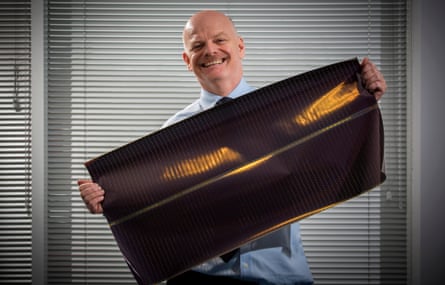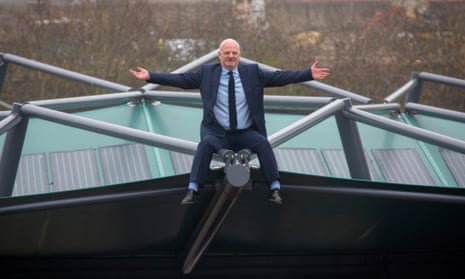It was as the moon hit the sails of his yacht in the Atlantic Ocean that the thought struck Perry Carroll.
“You’ve got a sail and you have got some sun, you must be able to find a way to put those solar sails on that fabric,” he said.
Little over a decade later and that idea – which first hit Carroll during a 635–mile race between Rhode Island and Bermuda – has developed into a business aiming to generate solar energy from awnings over car parks and on the tops of buildings where conventional rigid panels cannot go.
Carroll’s Cambridge-based Solar Cloth Company makes lightweight, flexible solar panels which can be rolled and fitted onto curved and flexible structures such as domes or coverings for agricultural land, as well as on the roofs of buildings unable to sustain the weight of glass panels.
“Solar is moving from being a hard, inflexible and one-colour product to being soft lightweight, flexible, and maybe even multicoloured,” he said. “In solar everybody only knows those glass panels going on roofs and on farmland, fields, solar farms. Why can’t solar be everywhere in all different types of aspects?
Why can’t it be so that when you pull your car into your driveway that there is a canopy that charges the thing?”
Carroll has been developing the panels since that lightbulb moment on the water, eventually bringing him to the bespoke products his company produces today.
The company uses thin film photovoltaics (TFPV), which are viewed as the second generation of solar technology. TFPV is light enough to be placed on plastics and weighs substantially less than conventional glass panels.

Carroll claims his panels are about 20% the weight of standard panels. There are drawbacks, however: they produce 15% less power than the current generation of panels and they cost twice as much. But the company hopes to open up new markets by emphasising the weight difference and the flexibility of the plastic roll, which open up new possibilities for siting solar cells. For instance, the cells can be bonded onto structural fabrics of buildings – which would make potential sites of the dome of the O2 arena in London or the Bird’s Nest National Stadium in Beijing.
“I didn’t invent solar, I didn’t invent fabric but I found a way to put them together. That is what we are, we are integrators. We are the only people in the world who can successfully do that on a commercial level,” said Carroll.
The rolls of TFPV can be fitted on top of a building over a few days, allowing for millions of square metres of space on structures to be converted to solar, said Carroll. In the UK, factories account for 13% of the UK’s energy consumption and most of them are potential sites for solar rolls, he said.
The company also intends to concentrate on fitting the panels on awnings in car parks, where the energy can then be fed directly into an electric car parked underneath.
“The government, the local authority, the general populace, the press, they all don’t want us to build [solar] in our countryside … so we have to use areas that we have,” said Carroll.
“We have got millions and millions of car parking spaces in Great Britain. According to the DVLA [Driver and Vehicle Licensing Agency], there are 30m cars on the road.” Carroll believes those car parking spaces – outside shopping centres, office complexes and airports – are a massive potential market for his awnings.
Outside the Cambridge offices of the Solar Cloth Company is a vision of what the firm wants the future of solar to look like – 15 car parking spaces with canopies fitted with their solar panels. The power which is generated from the panels is fed into the adjoining building while there is also a plug to connect to an electric car. Each of the car parking space awnings cost £12,500 to build, according to Carroll.
Another Solar Cloth Company product is the “solar sail” – a conventional sail covered with cloth panels – aimed at getting rid of the need for diesel generators on board yachts and powering the signage on petrol station forecourts.
When Carroll went to banks and angel investors looking for funding to advance into new markets, he was met with a blank wall, due to what he describes as a lack of enthusiasm for the the technology. The company turned to crowdfunding, which brought in over £1m.
So far the company has received £700,000 worth of orders for their products. The funding round gave the company a valuation of £7.5m, with Carroll remaining as the majority shareholder. The Solar Cloth Company hopes the price of its products will fall as they become more popular – a general rule for any manufacturer – but it believes more money should be poured into researching solar energy.
“Solar in Great Britain and in general is the poor relation in R&D. We have a video games industry in Great Britain which spends hundreds of millions of pounds on developing games,” said Carroll.
“You can’t play a video game without power. If you haven’t got any power, you can’t do anything, so can we not get the power right? It is like choosing the curtains for the new house before you have built it or decided where you are going to put the plot. And that is the focus that we have got to change. People are quite happy to buy a TV for £2,000 and change it in 10 minutes’ time for another one because it has got a bendy screen. But they are not prepared to pay for guaranteed energy? It [solar] has got to stop being sold like a cheap commodity, it has got to be sold as a solution to what your lifestyle gives you.”

Comments (…)
Sign in or create your Guardian account to join the discussion